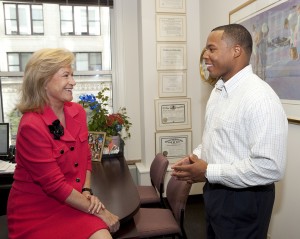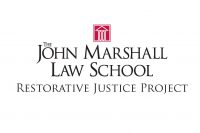
Justice Margaret Frossard talks with a student in her office. The Office of Professionalism and Engagement, the first of its kind in Illinois, has matched approximately 150 experienced lawyers with recent alumni and has drawn overwhelmingly positive feedback from the mentors as well as from the new lawyers.
The John Marshall Law School’s Office of Professionalism and Engagement, the first of its kind in Illinois, has served hundreds of students and alumni since the program’s inception in April 2011.
Among the initiatives spearheaded by the office, headed by retired Illinois Appellate Court Justice Margaret O’Mara Frossard, is the Lawyer-to-Lawyer Mentoring Program, operated in conjunction with the Illinois Supreme Court Commission on Professionalism. The program has matched approximately 150 experienced lawyers with recent alumni and has drawn overwhelmingly positive feedback from the mentors as well as from the new lawyers.
“It was an absolutely fantastic experience! Please sign me up for the next mentoring session,” says retired Circuit Court of Lake County Judge Ray McKoski, who also teaches at John Marshall. He added that the program was beneficial not only to the new attorneys. “All the mentors that I have talked to agree that the program helped them reflect on how they could improve in their own professional and personal lives.”
Frossard said the program goes beyond helping individual attorneys, whether they are newcomers or old hands.
“This program is a great way for attorneys to strengthen the legal community by helping new attorneys shape their careers,” Frossard said. “At the same time, mentors and mentees help themselves by earning six hours of professional responsibility CLE credit. It’s definitely a win-win.”
John Marshall Professor Barry A. Kozak, director of the Elder Law Programs, said he has long-mentored new attorneys informally, but the structure and mandates of the Lawyer-to-Lawyer Mentoring Program prompted him to develop specific strategies for helping the young lawyer he worked with most recently.
“In turn, I wound up learning a lot from my mentee, as each meeting was a discussion and not simply me listening and offering advice off the top of my head,” he said. “The bond formed between my mentee and me will hopefully endure for the remainder of both of our careers, and I certainly hope that he will become a mentor after he has some more experience under his belt.”
Attorney Jeanine M. Cunningham is currently a mentor in the program.
“There is a gap between the theory taught in law school and the reality of practicing law,” she noted. “A mentor can guide the mentee in the right direction … It is important for our profession to work together as attorneys, regardless of the level of experience, so that the clients are given the best of services.”
Katie Pimental (JD ’11, LLM ’12) recommends that all new lawyers participate.
“I met so many people in the legal profession that I never would have gotten the opportunity to meet and it has really expanded my network and opportunities for professional and personal growth,” she said.
Beyond the mentoring program, Frossard’s office aims to promote student engagement, lay the foundation for professionalism and prepare students to become responsible members of the legal community. Another key part of its mission is to help in the delivery of excellent customer service to students.
“This program has helped students at John Marshall, but it also fosters an environment that helps the entire legal community,” said Dean John Corkery. “Peg Frossard’s efforts have contributed immensely to our mission of developing practice-ready attorneys.”
Frossard in July 2011 launched a program that brings experienced members of the legal community into the classrooms at John Marshall. Every month judges, practitioners, alumni and others deliver a one-hour presentation to any class.
“After briefly discussing their own legal careers, the speakers explain to students what professionalism means in the workplace, how to resolve ethical challenges and how to achieve the professional skills valued by employers,” Frossard explained. “Those presenting frequently invite students to shadow them in the workplace.”
Frossard also has developed other initiatives including one-on-one meetings with students where she asks for input on what services they would like John Marshall to provide. She has conducted meetings with faculty to discuss professionalism issues; hosted a professionalism and engagement appreciation luncheon attended by 80 people including judges, attorneys and alumni along with students; and organized a jobs initiative program that has resulted in the hiring of 21 graduates and students in law-related jobs.
Current student David Latarski notes the importance of focusing on professionalism. He realizes that one wrong move from a new attorney could tarnish and haunt a reputation that is just being forged.”Frossard’s focus has been on incorporating professionalism in all aspects of the practice of law, from courtroom presence, to emailing and gestures to colleagues in passing,” he said. “Her insight has made me confident that I will graduate with the attitude expected of a lawyer.”
Jayne Reardon, executive director of the Illinois Supreme Court Commission on Professionalism, is another supporter of the efforts John Marshall is making in this area.
“Experienced judges and practitioners sharing with law students their personal stories of ethical and professionalism issues is an extremely valuable activity most consistent with the mission of the Commission on Professionalism to promote increased integrity, civility and professionalism in the legal profession,” Reardon said.
Additionally, Frossard also has arranged the Justice Burke Professionalism Series, a spring semester discussion program in collaboration with Reardon’s commission. Illinois Supreme Court Justice Anne Burke will launch the 2013 series at John Marshall on Feb. 20, 2013.

